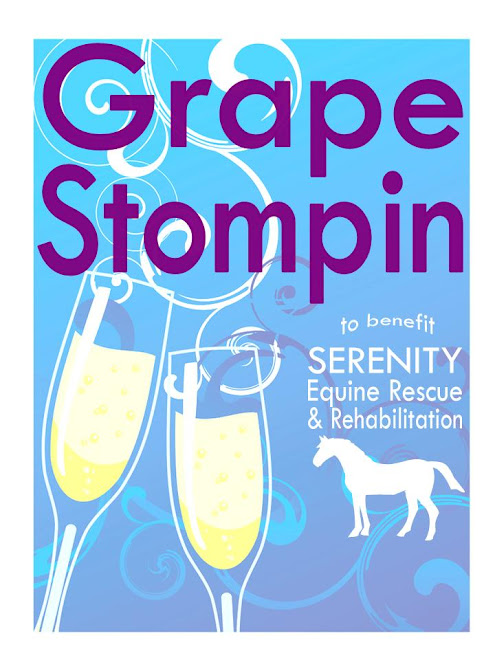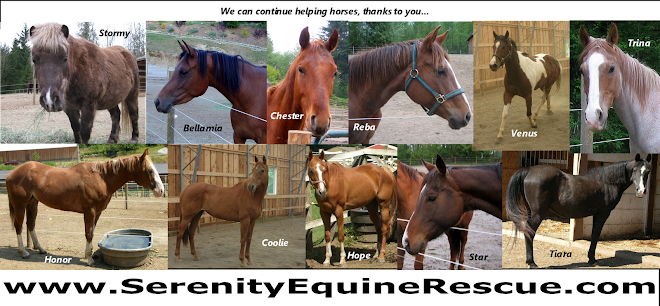People often ask how the recession and economy are affecting us at Serenity Equine Rescue and Rehabilitation. The main effects are increased feed costs, equipment costs, supporting materials cost and other of course the increasing costs of caring for the horses like shavings, medicine, supplies. One of our biggest challenges is having enough space and resources to take in the horses that desperately need us. As we always say, we just do our best to help horses, one by one.
But there is another challenge- not rescue, but ‘re-homing’. We get frequent calls for assistance with re-homing people’s horses. Many want us to take them into our rescue and ‘find them a good home’. We appreciate their desire to find someone excellent to take their horse but our mission is to rescue horses that are ill, neglected, abandoned who need our help. We try to answer every call that comes in but have to give priority to rescue situations and our donors, because our limited time and resources require it.
For that reason, we have worked hard to create this compilation of information to assist others in finding their horse a new home (selling or rehoming). With a little effort, your equine friend can find a quality new home.
THINGS TO CONSIDER (THE BASICS)
· Determine if you really want to sell/find a new home for your horse- can you lease him/her out or find a way to make it work financially? Consider your commitment to this pet.
· Be realistic about your price- the market is slow, and chances are you aren’t going to get back any investment .
· Be honest about your horse’s condition. Many horses end up at auction or abandoned because someone wasn’t being up front about behavioral issues, soundness, or capabilities. Some estimate that 1/3rd of the horses that go to autcion these days go to slaughter.
· Screen potential buyers- ask about the location and conditions of their facility, what they plan to do with the horse . Visit the facility if you can.
· Get cash- payment plans and other arrangements require a private treaty to be legal. If you agree to take payments put it in writing (see TERMS section below)!
WHERE TO ADVERTISE
Where can you go to sell? You can pay to run an ad in the little nickel, the
Free online ads- place a free online ad at any of these sites. Most offer paid upgrades to add photos, which may have your horse sell faster. See photo tips at the bottom.
www.dreamhorse.com
www.horsefinders.com/
www.warmbloods-for-sale.com
www.yardandgroom.com
www.2buyhorses.com
www.equine.com
www.horseville.com
www.equinehits.com
www.horseweb.com
www.theequineclassifieds.com
www.freehorseads.com
www.horsesonline.org
www.agdirect.com
www.equibus.com
www.horsetrader.com
www.donatemyhorse.com/
www.horsequest.com
www.liverystable.net/index.php
www.horsetopia.horse-for-sale.org/home.cfm/advertise.html
www.netequestrian.com/services/classifieds.asp
www.flyingchanges.com
www.region6.org
YOUR AD
Your ad: photo ads usually cost money ($10 and up per site) but also tend to bring a lot more attention to your ad. Be sure take the time to really describe your horse- a description that is 10 sentences long is going to garner more interest than a one sentence blurb. The market is saturated with horses- tell what makes your horse different, what made you fall in love with your horse…
The more honest you are, the more likely you are to actually sell the horse rather than deal with a bunch of lookers AND the more likely your horse is to find a home where he/she will stay. Use words like ‘potential’ with caution- have you ever tried the horse at the potential discipline?
Include the following
· Name
· Registered name
· Breed
· Height
· Broke to ride? Be sure to note if he/she is green or rusty from not being ridden. Remember, potential buyers will want to ride the horse if you’ve advertised him/her as broke.
· What disciplines- (English, western, trail, gaming- be specific about what he has done.)
· Experience (trails, shows, sports, etc)
· Basics- does he load, trailer, clip, bathe, stand for farrier?
· Is he current on shots, worming, feet, teeth?
· Any injuries/illness (current or healed) or any limitations to what the horse can do
· Any professional training?
· Behavior- any red flags (bite/kick, prefers men or women, aggressive to other horses, hates arena work, loves trails, loves water, etc)
A good potential buyer is going to ask for all of the above information (and check on it- looking at teeth and records) so be ready to answer.
Honesty when selling/re-homing can be the difference between a forever home and a pit stop on your pet’s way to the auction. Be sure to LISTEN to what the potential buyer is going to do with the horse. For example if your horse hates water, and they want a trail horse- discuss your concerns or the potential challenge of getting the horse to endure water obstacles.
PHOTOS
Photos - take a photos of your horse clean, brushed, and without tack so prospective buyers can see his/her conformation.
Ideally take one from front, back, left and right side. Additional photos of horse being ridden are good and even better is video of the horse working. Upload video to a service like www.youtube.com and you can just email a person a link to your video.
Remember, photos and videos are part of your horse’s resume so don’t use unattractive pictures and/or videos of him that are not flattering. Use your good tack- be sure it is clean and fits well. You do not need to coax your horse into tricks or unsafe situations to ‘show off’ a personality (a good buyer does not need pictures of you standing on your horse to believe he/she is trained and calm).
Ask a friend to help you out, photos and videos are much better done without trying to use self timers, etc.
RESPONDING TO INQUIRIES
Be ready to promptly answer calls and emails. Sometimes it is worth saving your first few responses to copy/paste into additional ones, since many people ask the same questions. People are going to want to know: any information from the Suggested Details list that you did not include. They’ll also ask how long you’ve had the horse, why you are selling and if he has any health issues. They will likely want to see you ride as well as ride themselves. Always have them sign a release before you let them ride your horse. Unfortunately it is a very litigious society that we live in.
THE MEETING/TEST RIDE
· Most people prefer to have the horse cleaned up and groomed
· Be sure you have space for them to ride- if you have nowhere on your property you may need to haul out somewhere to meet them
· They may want you to ride first, to watch, before they do- be sure you are dressed and ready to ride
· If your horse is due for shoeing or a trim be sure it is done before the meeting- you never get to change the first impression.
· Do not ever medicate, sedate or tranquilize a horse before you show him to a potential buyer- they will notice (signs are visible to those who know) or they will buy the horse under false pretenses.
· Be sure to provide any information that has not already been discussed and ask if they have any questions.
· Remember- even if you’ve talked online or by phone, a potential buyer is a stranger and should be treated like one. Do not leave valuables out, invite them into your home without supervision or offer information that could tempt someone to commit a crime.
· It’s always best to have a buddy with you for safety reasons.
TERMS
· Consider in advance how much you are willing to reduce your price (if offered a lower amount) and if you are willing to accept trades or terms. Planning ahead will help ensure that you don’t get the short end of the stick.
· If you decide to allow ‘terms’ (payments, etc) please remember that getting money from someone once the horse has gone home can be tricky- many horse owners have been left empty handed in these situations, use a written contract signed by both parties (preferably notarized) and consider how you’d handle no payment in case it happens- can you afford an attorney to collect your money or are you prepared to not be paid (worst case scenario).
· Do you want the horse back if it doesn’t work out? Discuss that before the horse leaves your farm. If you’re concerned, get it in writing. Many horses at auction and/or on the feedlot were once someone’s treasured pet.
OTHER TIPS
· Remember to have anyone who comes to meet your horse sign any release forms used at your farm or barn.
· If your horse is registered be sure to located his/her paperwork and have it ready to hand over.
Serenity Equine Rescue wishes the best of luck to anyone with the difficult decision to sell their horse.






No comments:
Post a Comment